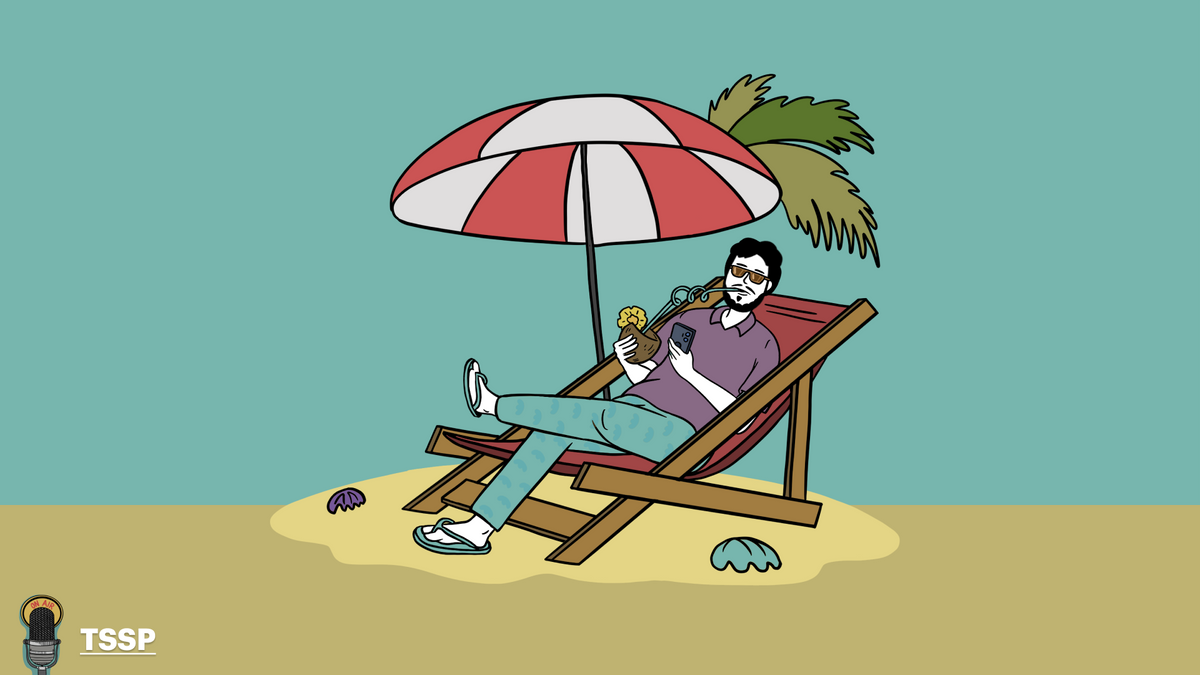We'll admit it. We like to take breaks. Not the Ross and Rachel break from Friends, but a deliberate one. When you work on a project for extensive periods of time, there comes a moment where your brain can refuse to cooperate further. Let's set the record straight—this lack of cooperation from your mind has absolutely nothing to do with your actual interest in said project. You still feel as passionately about it like you did before.
Why, then, did your mind just decide to tell go, "You know what? Not today."? This could be a sign of a burnout. A completely normal reaction to work-related stress that can translate into physical sense of exhaustion, heightened emotions and a feeling of diminished self worth at times. All of these can lead to a complete lack of productivity. And it's totally understandable.
But you know what's interesting about producitivity? It can ebb and flow at times, and while burnout is a HUGE reason why productivity can hit the wall, it's not the ONLY reason. Whatever the causes of your productivity going hitting a trough, there's one thing that CAN help boost it. Taking a break. Or a micro break.
Hi, I'm Nishtha and this is the Sketchnote Startup Podcast. Here's where we talk to you about the world of startups, productivity tools, personal developments, stories and a lot more. And before I go any further, I know you have an extremely pressing question.
"Taking a break? Boost productivity? Isn't that counterintuitive?" I know. This sounds like a complete scam made up by a chillled out guy who only wanted to take a break from work. Oh boy, do I have news for you. Science is totally on the side of that chilled dude who only wanted to put his feet up and relax that day.
First, let me tell you what I've been up to these days. Remember the episode we did about Wordle recently? Yep, I'm obsessed. Every morning, I need to crack the word of the day on the website and then post my score for everyone to see. Most days I get this in under 5 minutes. Some days it takes me forever. I stare at the screen till my eyes start to water and I'm wondering why I can't think of a simple word that starts with a K and ends with an ER.
So one day, I decided to take a break. I changed tabs and read through my Twitter timeline, went through a ton of good morning messages on my family WhatsApp group and decided to basically take my mind off Wordle for a while. It worked! Out of nowhere I managed to crack the word of the day. It pretty much naturally came to my mind, and I made it a habit to take a break and let the word come to me.
Now, I'm not saying all the solutions to your problems will come to you like a bolt from the blue, but they will once you take your mind off it. And that's not for too long, taking a small break after every few minutes of work—or a micro break, is actually great for your brain!
Here's what science has to say about it:
1 Taking a break replenishes your energy and mind
Have you ever seen a mountain of work on your desk and thought to yourself you will plot through it all today before the day ends, no matter what? Except your mind has decided to just shut down halfway through. No matter what you do, it won't start back up. This is called decision fatigue.
Every day when you work, you're faced with a series of decisions to make. They could be huge ones or tiny ones like whether or not you want to deal with a task that day, but your work can definitely be broken down into decisions that you need to make to push your project through. However, going through too many of them at once can cause decision fatigue, which can affect your willpower and reasoning.
Decision fatigue came to light based on a famous study based on decision making abilities of Israelis judges. The study saw that the judges were more inclined to giving paroles to prisoners after resuming work post a break. This, compared to , them taking a simple decision of saying "no" when they had been working for very long. The longer these judges worked, the closer to 0% the rate of granting paroles fell to.
So, once you take a break, your brain comes back refreshed and slightly more motivated to deal with tasks in a more complex manner. This, instead of simply looking for the easiest alternative, or procrastinating over it.
Which brings us to...
2 Using breaks correctly can help avoid procrastination
Wait, what? How's that even possible? It totally is. Let's tell you how!
To understand this concept, let's just admit one thing first. Procrastinators will procrastinate, no matter what. Unfortunately, when they finally decide to attack their work, it only leaves them little time fully grasp the tasks at hand.
Engineering professor Barbara Oakley explains that procrastinators tend to only do superficial focused-mode learning. They wait till they get that burst of conscious attention and energy and then pull an all night ear closer to the deadline. While tasks gets done this way, you don't necessarily do your best work or learn.
She suggests a simple work way to avoid this. The Pomodoro method. 25 minutes of focus, 5 minutes of rest, and get your best work out! When you work, take a break, and then work again, you train your mind to work to its best result. She adds that this allows you to practice your ability to focus intently, and practice your ability to let go and relax.
Sounds simple enough?
3 Rest allows you to absorb information
Quite like how memories form when you're asleep, there are studies to prove that taking rest while you're awake can help you form them too!
Say hello to a new funda called waking rest. Ever wondered why you like weekends? Amongst other reasons, it's the ability to be awake and have nothing much to worry about. THAT, my friends, is waking rest.
You give your mind a break from whatever it is your brain's been working on and allow it to wander. This downtime will let your brain recover and therefore review and remember what it learned before. Ferris Jabr, in a Scientific American article even says that this could help one achieve their highest level of performances, and even keep their moral compass in working order to maintain a sense of self.
4 Breaks help live stress free.
Let's face it. This is probably one of the most stressful periods of time for most human beings to live in. Not only are we living in an era where there's technological distractions at every step, we're also a generation now having to work with a hybrid style of living and working. Not to mention a global pandemic, conflicts, recession and more. It's easy to get overwhelmed in one's day-to-day running of affairs.
Stevan E. Hoffball spoke about a theory called model of conservation of resources back in 1989. It said that humans have a certain number of resources that they use to deal with situations and avoid psychological stress. If there's a sense of threat to said resource, it can cause stress, which will lead to them using other resources to compensate and try to save the first one. Confused? Let's explain this a bit better. Say you're in a job where you have a threat of losing your pay or job. You dedicate more time and energy into said job at the cost of your family life. This will lead to certain burnout, stress and emotional exhaustion that has strong relations with depressive symptoms.
In order to combat extreme situations like these, and to energise and replenish your mind, taking a break can help avoid stressors.
5: Take a break and reevaluate your goals
Last, but certainly not the least is a point we'd like to make by asking you to look into the future. When you're in for a goal that has a long-haul, it's best to sometimes take your mind off it. Even if it's just briefly.
Think back to a stressful few weeks leading up to a final exam in your life. It would be extremely easy to lose sight of the end goal of finishing and revising all your chapters before the final exam, and only think about how long and stressful the road leading up to it is.
Taking a break can help you take a step back and think about achieveing your targets the right way. Studies have suggested that this sort of forced break, when you have a longer goal in front of you can you help you refocus on what you'd trying to achieve, and keep your attention there. Remember, the longer away the goal is, the more frequent your breaks will need to be.
This brings us to a rather important question. How DO you take a break the right way? Too much and you may get complacent; too little and it won't serve the purpose. So, what does one do?
Well, to start off with, we already spoke about the Pomodoro method. It's a great, universally acclaimed technique that breaks your entire day into 30 minute segments, where you take a 5 minute break for every 25 minutes of work. The only catch is that you must focus yourself utterly and completely on your task for those 25 minutes. Once you're rid of the distractions, the breaks become that much more valuable and allow your mind to truly decompress. It also puts your decisions on a clock and aids your mind to make them faster, on a clock!
These breaks every 20-odd minutes are called micro breaks and are great for stretching, looking around, going for a short walk... More importantly, if you work with a computer heavily, this allows you to rest your eyes for a few minutes.
Like the Pomodoro method, there are other breakdowns like the 90-minute block method and the 52-17. The first one basically means you work for 90 minutes and take a 20 minute break, and the second asks you to take a 17 minute break per every 52 minute of work session.
Now, while there are several such popular methods available to try out, the idea is the same. Take frequent breaks every few minutes or hours—through the day. Unlike a few decades ago, where only the lunch and coffee break really counted as breaks, our understanding of how breaks affect the human mind has evolved to quite a degree. It's pretty evident now that the brain requires a few minutes off of work to repair, replenish, and restore it.
And the best part? Your productivity will actually go up if you're doing this the right way. What else do you need? So say goodbye to the guilt associated with taking breaks, and just do it!
Join us again next time for another fascinating tale from the world of startups and corporates. Also stay tuned for more interviews, byte-sized productivity hacks and much, much more. If you don't already, subscribe to our podcast, available now on all leading podcast platforms. Oh and don't forget to share this episode if you liked it. Tag us on Twitter, we're @SketchnoteCo.
Until next time, I'm Nishtha and this has been The Sketchnote Startup Podcast.
Sources:



